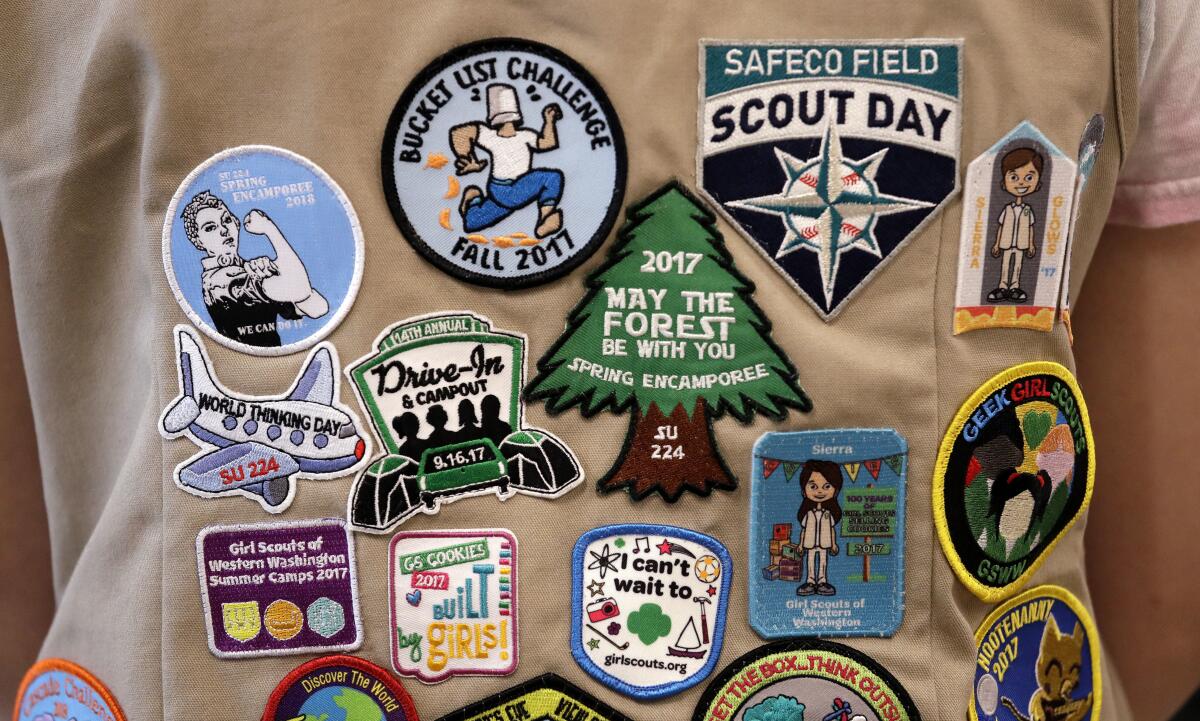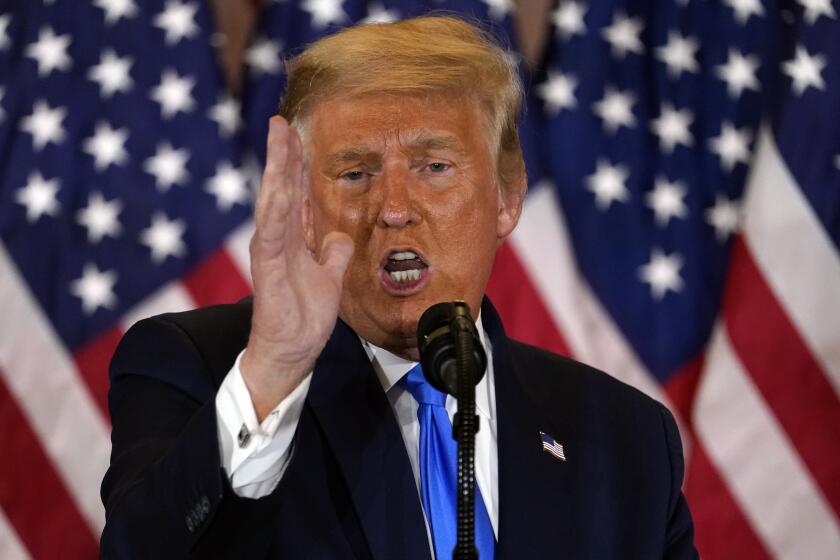Girl Scouts rebukes Boy Scouts in escalating recruitment war

- Share via
NEW YORK — The Girl Scouts is in a “highly damaging” recruitment war with the Boy Scouts after the latter opened its core services to girls, leading to marketplace confusion and some girls unwittingly joining the Boy Scouts, lawyers for the century-old Girl Scouts organization claim in papers filed in a federal court.
The competition, more conjecture than reality two years ago, has intensified as the Boy Scouts of America organization has unfairly recruited girls lately, according to claims in legal briefs filed on behalf of the Girl Scouts of the United States of America.
The lawyers filed papers in Manhattan federal court Thursday to repel an effort by the Boy Scouts to toss out before trial a trademark infringement lawsuit the Girl Scouts filed in 2018.
Last month, lawyers for the Boy Scouts asked a judge to reject claims that the Boy Scouts could not use “Scouts” and “Scouting” in its recruitment of girls without infringing trademarks.
Enhanced unemployment benefits expire Sunday, and the federal government shuts down Tuesday, unless Trump signs a massive spending bill Congress has approved.
They called the lawsuit “utterly meritless.”
The Boy Scouts on Saturday pointed to legal arguments in which it blames the Girl Scouts for reacting to its expansion plans with “anger and alarm” and said the Girl Scouts launched a “ground war” to spoil plans by the Boy Scouts to include more girls.
In a statement, the Boy Scouts — which has it recruits pledge to be “trustworthy, loyal, helpful, friendly, courteous and kind” — said it expanded program offerings for girls “after years of requests from families” who wanted their boys and girls both participating in its character and leadership programs or for other reasons, including a desire to become an Eagle Scout.
“We applaud every organization that builds character and leadership in children, including the Girl Scouts of the USA, and believe that all families and communities benefit from the opportunity to select the programs that best fit their needs,” the statement said.
In its filing, the Girl Scouts said the Boy Scouts’ marketing of expanded services for girls was “extraordinary and highly damaging to Girl Scouts” and had set off an “explosion of confusion.”
“As a result of Boy Scouts’ infringement, parents have mistakenly enrolled their daughters in Boy Scouts thinking it was Girl Scouts,” the lawyers said, adding that this never occurred before 2018.
The Girl Scouts said it could prove there were “rampant instances of confusion and mistaken instances of association between Boy Scouts and Girl Scouts” after the Boy Scouts targeted girls and their parents with marketing and recruiting communications in ways it never had before.
In its statement, the Boy Scouts said: “To imply that confusion is a prevailing reason for their choice is not only inaccurate — with no legally admissible instance of this offered to date in the case — but it is also dismissive of the decisions of more than 120,000 girls and young women who have joined Cub Scouts or Scouts BSA since the programs became available to them.”
But the Girl Scouts maintained that “the parties’ programs, which have many similarities, are now directly competitive.”
The organization cited proof from a narrow subset of documents turned over by 19 of 250 local Boy Scout councils, including evidence that registration fees sometimes were returned to parents who mistakenly thought they had registered girls for the Girl Scouts.
It said repeated instances of confusion and interference at the local level by the Boy Scouts were a tiny fraction of what was occurring nationwide.
Each of dozens of times the Girl Scouts complained about unfair marketing, the Boy Scouts responded by blaming individuals, churches or others for what it said was an isolated incident, the lawyers said.
“According to Boy Scouts,” the Girls Scouts lawyers wrote, “blame for the rampant marketplace confusion lies at everyone’s feet but its own.”
Both the Girl Scouts and Boy Scouts, like other major youth organizations, have seen declines in membership in recent years. Pre-pandemic, competition from sports leagues and busy family schedules had increased.
In spring 2018, the Boy Scouts program for 11-to-17-year-olds announced it would change its name to Scouts BSA in early 2019. The parent organization, the Boy Scouts of America, and the Cub Scouts, a program serving children from kindergarten through fifth grade, kept their names.
The organization started admitting girls into the Cub Scouts in August 2018, and Scouts BSA began accepting girls in February 2019, lawyers said.
Afterward, Boy Scouts councils and volunteers began using Girl Scouts’ intellectual property to recruit girls, employing targeted advertising utilizing terms such as “Scout, Scouts, Scouting, Scout Me In and Scouts BSA,” the lawyers wrote.
“Boy Scouts knew full well in 2017, just as it had in the 1930s and 1970s, that SCOUT, SCOUTS and SCOUTING, when used in connection with girls’ services, could only create associations with Girl Scouts unless other distinguishing content referencing Boy Scouts of America appeared in advertising and promotional materials,” they said. “But it did so anyway, and the only plausible inference is that its motive was to free ride off of Girl Scouts ‘impeccable’ reputation and boost its position in a ‘new market — Girls in Scouting.’”
The lawyers said Boy Scouts councils in Illinois acknowledged improperly using the Girl Scouts’ slogan in Cub Scout recruiting materials and pictures of Girl Scouts to promote a Boy Scouts “Scouts Sign-Up Night!”
They said a western Massachusetts Boy Scouts council posted a recruiting flier on Facebook including a photograph of a girl depicted in her Girl Scouts Brownie uniform.
Meanwhile, Ohio Boy Scouts used the Girl Scouts trademark to try to get a local newspaper to write an article, suggesting a storyline titled, “Boy and Girl Scouts Looking for Members,” even though the recruitment involved only the Boy Scouts, the lawyers said.
In Seattle, a Boy Scouts council used the Girl Scouts trademark in social media recruiting materials, the lawyers said.
They said confusion had spread widely among children, parents, schools and religious organizations, and they cited examples in other states, including Florida, Minnesota, Arkansas, Michigan, North Carolina and Hawaii.
More to Read
Sign up for Essential California
The most important California stories and recommendations in your inbox every morning.
You may occasionally receive promotional content from the Los Angeles Times.














